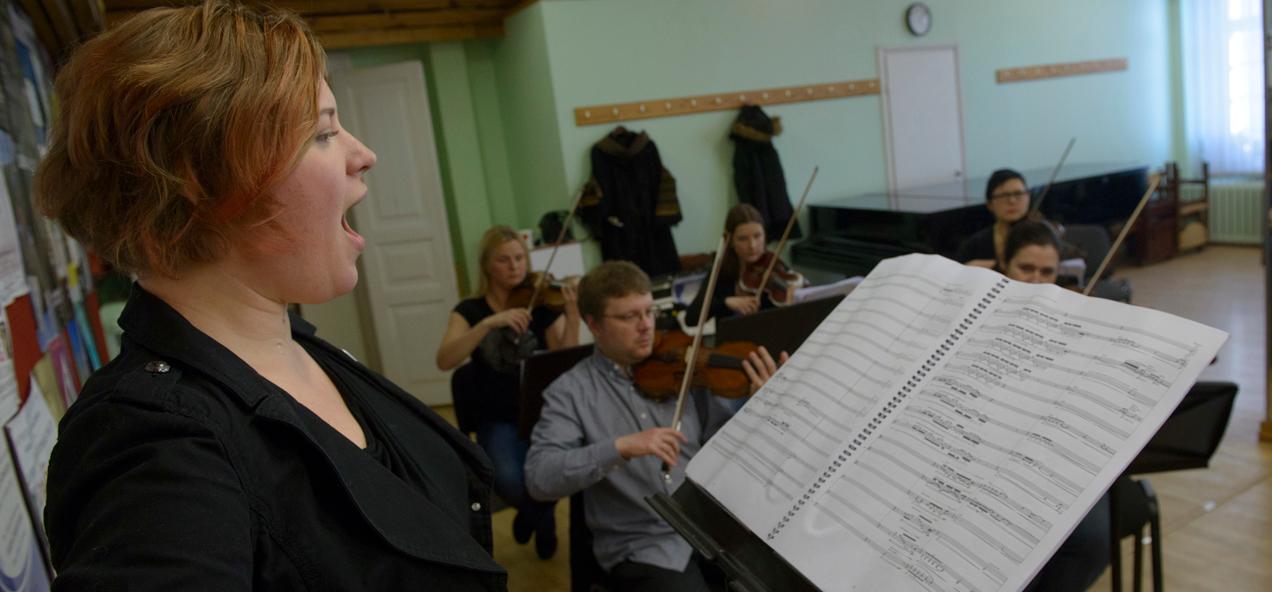Twitter feud hits all the right notes: Estonia v Paul Krugman, the opera
Singer Iris Oja performs with members of Estonia’s Tallinn Chamber Orchestra during a rehearsal of the opera “Nostra Culpa.” US composer Eugene Birman composed an opera based on a Twitter feud between the Estonian President Toomas Hendrik Ilves and New York Times columnist Paul Krugman.
TALLINN, Estonia — “Fiscal stimulus trumps. Increased public debt. Devalue!”
You’d expect to hear that in a debate between economic policymakers, perhaps — not a rehearsal by musicians practicing to stage an opera.
But that’s where composer Eugene Birman reads those words as the Tallinn Chamber Orchestra rehearses his libretto inside a stately medieval guild house in the heart of the Estonian capital.
It’s part of “Nostra Culpa,” what he describes as a “financial opera” that was inspired by this country’s brief turn at the center of a raging debate over how to tackle the financial crisis paralyzing Europe and dragging on the global economy.
It took place last summer, when the former Soviet republic became a poster child for the euro zone’s austerity drive in an improbable but dramatic war of words between the American economist Paul Krugman and Estonia’s President Toomas Hendrik Ilves.
Their exchange was partly prompted by a GlobalPost article about Estonia’s booming economy austerity supporters pointed to as evidence spending cuts are more effective than economic stimulus.
Krugman weighed in, saying statistics about Estonia’s growth had been presented in a misleading way.
Ilves — who grew up in the United States after his family fled Soviet rule — responded on Twitter by attacking the Nobel laureate’s credentials with a series of escalating barbs. “Let’s shi*t on East Europeans,” he said, sarcastically goading a “smug, overbearing & patronizing” Krugman he accused of treating his fellow countrymen like “wogs.”
Now composer Birman and journalist Scott Diel have creatively interpreted the spat in the form of a 16-minute cantata that will premier in Tallinn on Sunday.
Although the idea may raise eyebrows among both economic analysts and music lovers, the Latvian-born American composer believes the story has suitably epic proportions and all the passion needed for a dramatic opera.
When the Estonian economy plummeted five years ago, the government began slashing spending in health care and other key areas and raising taxes. By 2011, the country boasted a budget surplus, low national debt and GDP growth of 8.3 percent, the European Union’s highest.
Some took that as proof austerity works. However, Krugman debated in his New York Times blog that the argument isn’t entirely accurate because GDP hasn’t returned to its 2007 level.
The leading austerity critic continues to lock horns with EU officials. He recently took a personal swipe at EU Economic Commissioner Olli Rehn by referring to a “Rehn of Terror” in a February blog post.
Birman wryly points out that artists such as himself have as much interest as anyone in the merits of public spending cuts.
“We can look at this in a very basic sense and say, because some countries are concentrating on austerity, composers are making less money from government funding,” he laughs.
But the composer insists his opera — in which Estonian mezzo-soprano Iris Oja sings the words of both protagonists in separate movements — doesn’t choose sides in what he sees as a clash between two fundamentally opposing viewpoints.
Birman, who has a bachelor's degree in economics, says he’s acutely aware the drama isn’t fiction. It’s about real people, he says, the ordinary Estonians who elected the government and must live with the consequences of its austerity policies.
Outside the guild house where the orchestra is rehearsing in Tallinn's picturesque medieval center, many locals support its approach.
“I believe this way we’re better off in the end,” Heiki Velba says. “If we borrowed money, it wouldn't be our own money. We'd still have to pay it back.”
Others say the president’s Twitter outburst went down well with the Estonian public.
“It was a big deal,” Raudo Lepik says. “People were saying that some American doesn't have a right to tell us what to do.”
Nevertheless, he’s wary of Estonia being presented as a success story abroad. “Sometimes it feels like our politicians care only about our image abroad,” he says. “In fact, things aren’t that great.”
Predictably perhaps, officials here insist Estonia has plenty to boast about.
“Estonia is an example of the triumph of smart consolidation [of our economy],” Finance Minister Jürgen Ligi said in an interview. “What else could Estonia want when we are the fastest growing economy of the current decade in the euro zone and have the smallest debt in the EU?”
He plays down Ilves’s robust, if less economically centered, defense of such consolidation as an amusing side show.
“Of course, that particular emotional reaction did not fully lay out our comprehensive pro-consolidation arguments,” Ligi said. “We followed the emotional reaction of our president with amusement, but when someone asked me if he could have been a bit tipsy before tweeting, my joking answer was that of those two, only Krugman could have been drinking any alcohol.”
More from GlobalPost: Euro zone unemployment reaches a record 12 percent high
The minister said he’s unlikely to attend the opera’s premier. “It is likely to include matters that could annoy me,” he said.
Still, Birman hopes its protagonists will watch the show.
“Paul Krugman and President Ilves got personal invitations,” he said. “If they did both come, I think it would be their first meeting — it would be very interesting.”
Every day, reporters and producers at The World are hard at work bringing you human-centered news from across the globe. But we can’t do it without you. We need your support to ensure we can continue this work for another year.
Make a gift today, and you’ll help us unlock a matching gift of $67,000!
